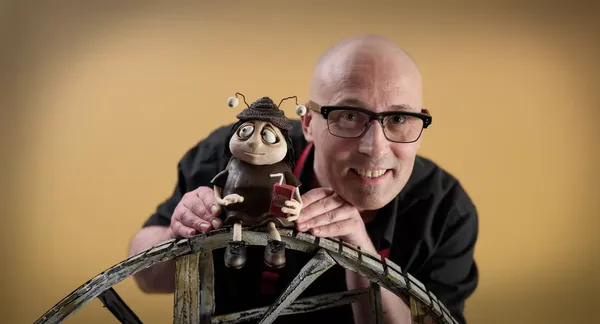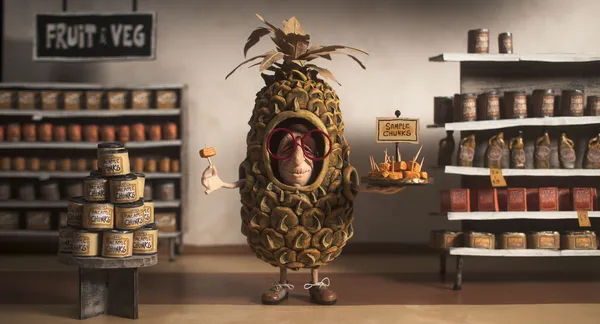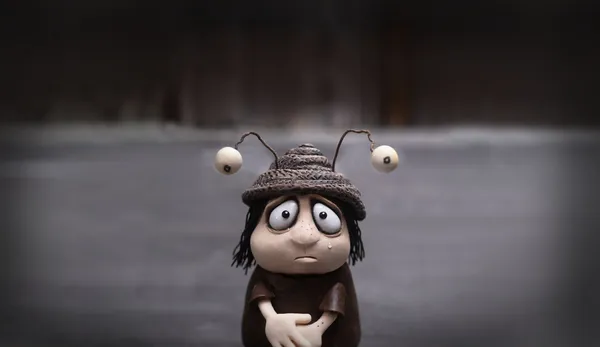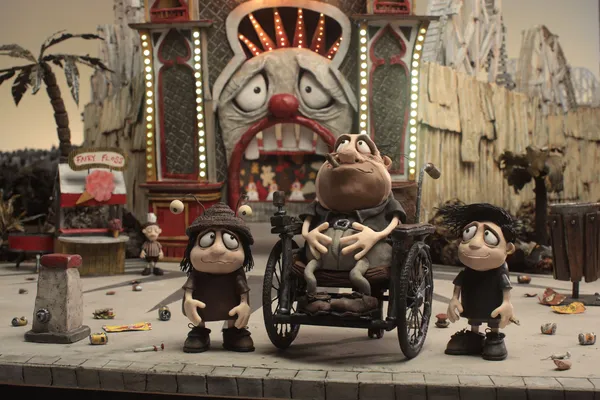 |
| Adam Elliot with Grace. He says: 'I've always made films about the underdog and people who are misunderstood or perceived as being different' |
Adam Elliot’s fans have had to wait a long time for his feature follow up to his 2009 “clayography” Mary And Max, with Memoir Of A Snail finally premiering at Annecy International Animation Film Festival last week. The stop-motion animation is in the same tragicomic vein as the rest of his work and charts a series of unfortunate events that befalls young Grace Pudel (pronounced “puddle”) from childhood to middle age. After the death of her paraplegic dad Percy - in the sort of kind of funny, kind of sad circumstances Elliot is a master of, Grace (Sarah Snook) and her pyromaniac twin brother Gilbert (Kodi Smit-McPhee) are sent to foster homes on opposite sides of Australia.
While Gilbert has to contend with a family of cult-like Bible-bashing apple farmers, Gracie finds herself turning to hoarding to fill the void she feels in the house she shares with a pair of key party loving swingers. Her one bright outlet is Pinky (Jacki Weaver), an elderly eccentric who has a devil-may-care attitude. Elliot has said that he loves films like Hal Ashby’s Harold And Maude, which seems a perfect fit, since Pinky is a kindred spirit of Ruth Gordon’s irrepressible Maude.
Catching up with Elliot over Zoom after the film’s premiere at the French film festival, he says, “she’s an amalgamation of people I know”.
He adds: “I've always loved films where there's relationships with a huge age gap, and Mary And Max had that same age gap. I love having elderly characters, because they're wise. They've got war stories and battle scars, and I always wanted Pinky to have a mysterious past. But she's an amalgamation of quite a few people. She’s been dragged through the mud but survived and prospered and has lots of wisdom to impart.”
There’s something terrifically “lived in” about Pinky, not least because of the hand-crafted attention that has gone into her look. But it’s a hallmark of all Elliot’s characters, from his shorts including Harvie Krumpet and Ernie Biscuit through to his features, that no matter how absurd they are, they are also reassuringly human. Elliot also doesn’t shy away from their excesses - whether it's over-drinking, over-eating or Grace’s burgeoning collection of snail paraphernalia.
 |
| Pinky in Memoir Of A Snail. Adam Elliot: 'She’s been dragged through the mud but survived and prospered and has lots of wisdom to impart' Photo: Arenamedia Pty Ltd |
Elliot says: “I've always made films about the underdog and people who are misunderstood or perceived as being different or, I mean, I never use the word disabled, I don't see them as disabled, I just see them as the other. And I'm not really interested in telling stories about people who are heroic. They certainly do things that are brave and courageous, but I don't see them as heroic, I see them as everyday. The truth is, they're all based on people around me. I don't have to look far. Luckily, I have quite a few eccentric relatives and cousins and friends. So I've got plenty of fodder.”
I wonder how all of these people feel about becoming aspects of characters in Elliot’s invented worlds.
He laughs and says: “I never I never let them read the screenplays. So it's not until they're in the cinema. I remember with Sundance, we were the opening night film and my parents flew over. They had to sit in the audience and dad watched himself - there's a scene where he gets drowned by a tidal wave. And Harvie Krumpet dies from a blood clot to the brain. I do give them cruel deaths. I have a fascination, by the way, with peculiar deaths. I have a journal of peculiar deaths.”
Somehow, that’s not a surprise, since one of the most memorable character dispatches of the current century has to be a mime who ineffectually puts up a tiny umbrella before being crushed by an air conditioning unit in Mary And Max (if you haven’t had the pleasure, you can see it at the end of the trailer).
“I’d always wanted to kill a mime artist, he says, “Who hasn’t?”
Elliot’s dad has provided plenty of inspiration down the years because he had an unusual job.
“He was a vaudevillian, an acrobatic clown with my uncle Barry and they toured the world in the Sixties and early Seventies. And dad appears in many different guises in my work, and there are certainly parts of him in Percy Pudel. So, mum and dad, they're great source material. I always say my mother's the funniest person I've ever met. She doesn't think she's funny at all. But she is.”
The acrobatics certainly fit with Elliot’s inventive visuals, which often feature people getting up to absurd antics, but his scripts are also things of beauty, crafted so that the wordplay also has a satisfying bounce. I ask him whether the inclusion of The Two Ronnies as one of the TV shows Grace watches with her dad and brother is a nod to his love of clever scripting and building an idea until it becomes funny.
Elliot says: “Every Friday night we had to watch The Two Ronnies. I think it was after The Muppet Show. I love puns and I love wordplay and I write poetry or bad poetry. I just love the English language and the phonetics of certain words. I love writing, it's my favourite part of the process. Like most writers would say, it's the most challenging but I know when I get to the end of each screenplay, I always think, ‘Oh, damn, now I have to turn this into a film. I wish I was a novelist. I could just finish now and get it published’.
From the words to the look there’s always a sense of detailed texture to Elliot’s film, including how the characters smell. Pinky, for example, is described as smelling like “ginger and second-hand stores” which conjures a olfactory world to go with the one we can see on the screen.
 |
| Grace in Memoir Of A Snail. Adam Elliot: 'I always try and push as many buttons on the audience as I can and and keep the film being unpredictable' Photo: Arenamedia Pty Ltd |
Elliot also finds strength in contrasts. In the smell department, for example, he talks about Pinky baking gingerbread men with marijuana in them, which is the sort of thing that’s amusing when it’s put together in your mind. He does the same thing with emotions, so that laughter and sadness are often a hair’s breadth apart.
Elliot explains: “I learned very early on in my second film, Cousin, that you can really play with the audience and have simultaneous emotions happening. And there's a moment in Cousin where you find out his parents have both died in a car accident but at the same time, you're reading a T-shirt he's wearing that says, “I yodel for Jesus” so the to the audience don't know whether to laugh or what, so I love that sort of conflict emotional conflict you can you can attempt.You don’t always get away with it, but I always try and push as many buttons on the audience as I can and and keep the film being unpredictable. To keep them not knowing what I’m about to do to them.”
Part of why the shock factor works is that the animated characters are “cute” at some level, but Elliot is constantly undercutting that. So there’s a tension between what people might expect from a stop-motion and what he delivers.
“As a writer we are expected to push the boundaries and take risks and deal with subject matter that can be taboo or challenging. And I think so many of us have grown up with stop-motion, and of course, Wallace and Gromit and Gumby, which are more for children. But why can't stop motion be for adults? There's a lot more adult animation being made, and why not play with the art form?”
There’s a lot going on in Elliot’s films, so does he think about how the visuals will look first or how the characters will sound? Both, it turns out.
“I think it's simultaneous. I love writing the dialogue. But it's always that balance of do you see it or do you say it? Should you deliver the information verbally or should you see it? And, of course, we should always see it. But it's whatever wins. Sometimes it's not until you do the sound mix that you think really the music should be the most prominent part of this at the moment.
“I don't really start designing the characters until the script is in good shape. We don't touch the plasticine until much, much later. So I go from the screenplay directly to storyboarding. And I still do all my own storyboards on paper with a pencil because I don't feel the story is complete until the storyboard is done. And then we can really start the fun part.”
The nod to the craft involved extends to a note at the end of the film’s credits which specifies that it was “made by humans”. Although he says he put it in “as a novelty” there is a lot of discussion about the movement towards the use of artificial intelligence in artistic work.
“There's a lot of discussion here at Annecy about AI and there's even the first AI short animation and that's been very divisive. So it's good that it's being discussed and debated. I think stop-motion’s okay for the moment, it's safe, because of the fingerprints on the clay and that these objects, these characters, the props and the sets all look handmade, and they are. So I think there's that appreciation there. But who knows, who knows, maybe in five years, I'll be replaced by AI.”
There are certainly plenty of props to be looked at. As Grace is a hoarder, she has an absolute cornucopia of snail-related tat around her home. I wonder how Elliot knows when to stop in a situation like that.
Given just how long these films take to bring to the screen, I ask whether Elliot is still keen to make more.
He says: “Of course, I've never given birth, but you know, it’s that thing of ‘Oh, God, I'm never going to have another baby. It was horrific giving birth’. But then the baby's born and then people look at it and it's a nice baby. And so yeah, I do want to get pregnant again. I think you learn from every film, you think, ‘Oh, you know, I'll do that differently’. The budget for this film was extremely low and probably the biggest challenge was making the film I wanted to make with such a small budget. But also, when I was at film school, I came up with this idea of making a trilogy of trilogies. So I wanted to make three short shorts, three long shorts and three features. And I never thought it would happen. But I'm actually now up to number seven. So I've only got one feature and one long short and then I can die.”
He adds: “I really thought we could do it for the budget we had. And we certainly ran into financial difficulties in post-production. And so even with all the compromise, and everybody working for minimum rates, and even the big name actors working for peanuts, I feel like we've made one too many compromises.
“I'm glad the film's been well received. But, you know, we had to rely on the narration a lot. And we had to rely on voice-over, we had to avoid walking and talking. And that gets old. You think, ‘If we could afford the character to say one more sentence’. So I think for the next film, I have to have a healthier budget.”
Memoir Of A Snail will be distributed in several territories, including by Madman Films in Australia and by IFC in the United States. No UK deal has yet been struck

























